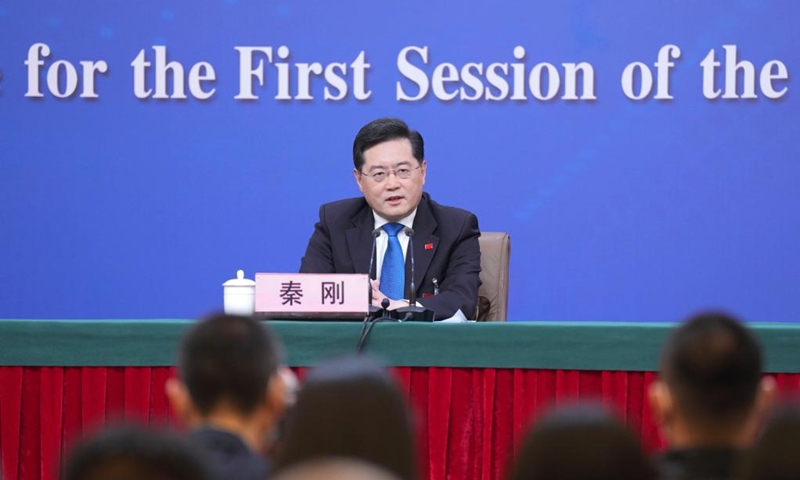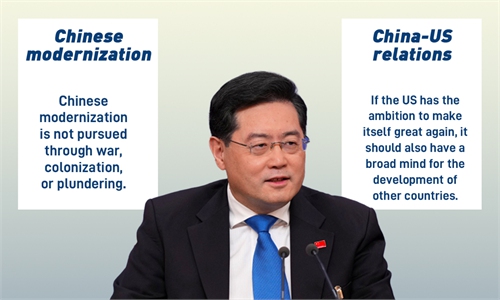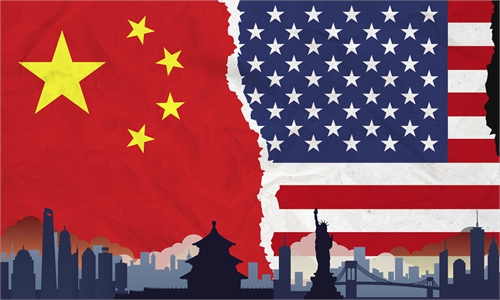What important messages are conveyed at Chinese FM’s press conference

Chinese Foreign Minister Qin Gang attends a press conference on China's foreign policy and foreign relations on the sidelines of the first session of the 14th National People's Congress (NPC) in Beijing, capital of China, March 7, 2023. Photo: Xinhua
Chinese Foreign Minister Qin Gang attends a press conference on China's foreign policy and foreign relations on the sidelines of the first session of the 14th National People's Congress today, and these are the points that impressed me most.First of all, there were a total of 14 questions at the press conference, with 7 questions from Chinese and foreign journalists each. Among foreign journalists, only those from NBC and AFP had the opportunity to ask questions, and one question was raised by Japan's NHK. The other 4 questions were asked by journalists from "non-Western" countries, namely Egypt, Russia, Pakistan, and Singapore. China's Ministry of Foreign Affairs used this arrangement to guide people's understanding of the "international community" and "world public opinion." Many Chinese people used to think that the American and European media represented international public opinion, but that is a misconception. The American and European media have a loud voice on the international stage, with great discourse power, but they do not represent global public opinion. This press conference showcased the true face of international public opinion.
Secondly, Qin does not shy away from thorny issues, and he articulates China's stance on those questions clearly and succinctly. He is also skilled at using examples to vividly illustrate his points, showcasing his own clear thinking and exceptional communication abilities, as well as China's diplomatic principles and capabilities. Regarding the Taiwan question, his response is unique: He brought him with a copy of the Constitution of the People's Republic of China, using it to immediately clarify the essence of the Taiwan question and the unshakable red line involved. "Mishandling of the Taiwan question will shake the very foundation of China-US relations," he said.
Thirdly, Qin clarified what Chinese modernization means. Chinese modernization is dedicated to peace, development, cooperation and mutual benefit, and is committed to harmony between humanity and nature, said Qin. It is a new path different from Western modernization. His explanation was easy for Chinese people to understand, and it is believed that more foreigners will be able to understand and support it as well.
Fourthly, regarding the China-US relationship, the US has come up with a whole set of deceptive rhetoric to deceive the international community, which China has continuously debunked. Qin gave an excellent summary, stating that the US claims that it seeks to out-compete China but does not seek conflict, yet in reality, its so-called competition means to contain and suppress China in all respects, and get the two countries locked in a zero-sum game. Comparing China and the US to two athletes competing in an Olympic race, Qin said if one of the athletes, instead of focusing on giving one's best, always tries to trip or even injure the other, that is not fair competition but malicious confrontation and a foul. He said the US rhetoric of "establishing guardrails" and "not seeking conflict" simply means China should not respond in words or action when slandered or attacked. When answering the Taiwan question, Qin emphasized that its solid anchor is the one-China principle and its genuine guardrails are the three China-U.S. joint communiqués.
Fifthly, regarding the China-Russia relationship, he said that China-Russia relationship is based on no alliance and no confrontation and it doesn't target any third party. It is not a threat to any country, nor is it subject to any interference or discord sewn by any third party. In response to questions on whether it is possible for China and Russia to drop the use of the US dollar and the euro in bilateral trade settlement, Qin said that whichever currencies that are efficient, safe and credible will be used. Currency should not be a trump card for unilateral sanctions, still less a disguise for bullying or coercion.
Sixth, regarding the Ukraine crisis, a Global Times journalist raised the issue that some Western media have recently taken China as a target, demanding that China not provide lethal aid to Russia, hyping the "special responsibility" of China. Qin responded China always makes its own judgment independently based on the merits of the issue. China chooses peace over war, dialogue over sanctions, and cooling down the situation over fueling the flame. He noted China is not the creator of the crisis, nor a party directly concerned. "What has China done to deserve being blamed, or even sanctioned and threatened? This is absolutely unacceptable," he said.
Seventh, regarding China-Japan relations, Qin pointed out that to foster a China-Japan relationship for the new era, it is important to honor commitments, learn lessons from history, and promote win-win cooperation. He emphasized that today's international order is built on the victory of the world's anti-fascist war, which cost the lives and blood of 35 million Chinese soldiers and civilian.
Eighth, regarding "Wolf Warrior" diplomacy and the outside world's evaluation of himself, Qin said "The so-called 'wolf warrior' diplomacy is just a narrative trap" when refuting the claim that the country adopted the so-called "wolf warrior" diplomacy. He figured out that Chinese diplomats would have no choice but to confront them head on to protect the motherland when jackals and wolves are blocking the way, and hungry wolves are attacking China , Qin said.
Finally, Qin quoted the phrase "The rise and fall of the world is the responsibility of every individual" to inspire young people in China. I believe that this traditional call is worth revisiting for all of us. China's rise has undoubtedly reached a critical point, and the US and its main allies like Japan cannot tolerate China's revival. We all need to firmly stand with the country. We are busy with our own livelihoods on weekdays, but we must never forget that a strong country means an improvement in the foundation of our personal struggle, and the country is the outermost barrier protecting our personal interests. Whoever does not let our country be good, whoever wants to contain and destroy China's development, we will fight against them. Additionally, we will never agree to anyone who smears the patriotism of the Chinese people.
The author is a commentator with the Global Times. opinion@globaltimes.com.cn



